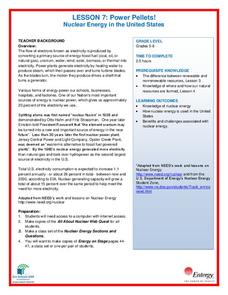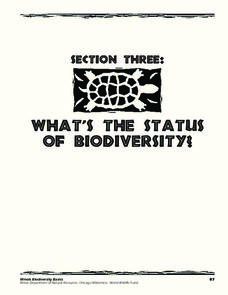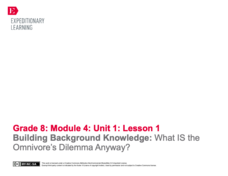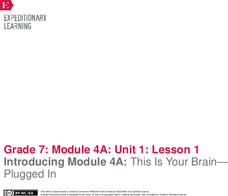Curated OER
Gallery Walk Questions on Earth's Radiation Balance
Questions that can be used in a lesson on Earth's radiation balance are suggested in this resource. It is not a lesson plan, per se, but it is a list of questions for stations within a "Gallery Walk" lesson. The link to how Gallery Walks...
Curated OER
Gallery Walk Questions on Rivers
A Gallery Walk is a technique that allows small groups to visit different stations, where they examine and discuss materials about an overarching topic. Questions about rivers and fluvial processes are available in this resource;...
Curated OER
Gallery Walk
After reading Mowgli's Brothers, each third grader will choose an animal and write a poetry, in couplet form, for that animal. Then, they complete a black-line drawing of their animal. Consider having learners post both of their finished...
Core Knowledge Foundation
Unit 9: The Science of Breakable Things by Tae Keller
A novel study examines The Science of Breakable Things by Tae Keller. Fifth graders participate in daily readings, discussions, and assignments following an "ask, explore, imagine, observe, and understand" routine. A final performance...
National Wildlife Federation
Power Pellets! Nuclear Energy in the United States
Nuclear power provides about 20 percent of the energy generated in the United States. The seventh activity in the series of 12 tackles nuclear power. After sharing what they know about nuclear energy, scholars complete a WebQuest make a...
Illinois Department of Natural Resources
Section Three: What's the Status of Biodiversity?
Biodiversity is essential for every habitat, but many species are at risk due to pollution and other factors. Explore several different species native to Illinois in a gallery walk with posters that learners have created after research...
Curated OER
Gallery Walk Questions on Weathering and Mass Wasting
A set of questions on weathering and erosion are found in this resource. Some of them can be used as discussion topics or lecture guides. There are also suggested activities such as the examination of topographic quadrangles and the...
Curated OER
Cell City Project - You are the Designer!
How can something as large as a city and as small as a cell have anything in common? That is exactly the question young scientists explore with this engaging life science project. Choosing to focus on a city, school, factory, or other...
Science Geek
Build a Food Web Activity
Entangle your life science class in learning with this collaborative food web activity. Using pictures of the plants and animals native to a particular ecosystem, young biologists work in small groups to construct visual representations...
A Mighty Girl
Rosalind Franklin
Rosalind Franklin, the Dark Lady of Science, is featured in an intriguing poster that is sure to inspire young scientists.
Curated OER
Gallery Walk Questions about Energy and Material Cycles
Students state the physical, chemical or biological processes associated with these environments: Pelagic ocean zone, California coat Cave, Indiana Barrier island beach, North Carolina Sand dune, Dunes National Park, Colorado Wetland and...
Bonneville
Copper Oxide Cell Data Sharing
Sharing is caring—and good for learning, too. Learners share data from the experiment in the previous lesson by engaging in a gallery walk. They then consider and discuss the conditions under which a solar cell will have its maximum...
EngageNY
Building Background Knowledge: What IS the Omnivore’s Dilemma Anyway?
What's the best thing on the menu? Scholars enter the room, complete a gallery walk of menus to choose a food to pretend to order, and then discuss how they made the decision. Next, they read The Omnivore's Dilemma and relate their...
EngageNY
Building Background Knowledge and Making Inferences: What Is a Natural Disaster?
That's a disaster! Scholars complete a gallery walk to view images and make inferences about natural disasters. They fill out a note catcher about what they observe and infer any questions they may have. They then participate in a World...
Curated OER
Designing a Crew Exploration Vehicle
Take your class on an out-of-this-world adventure with this fun engineering design lesson plan. Working in small groups, young scientists design, build, and test crew exploration vehicles using some creativity, teamwork, and...
NOAA
Seafood and Human Health
Whether your young biologists realize it or not, humans play a significant role in marine ecosystems. To help them understand this fact children first create graphical representations that show homo sapiens' place in marine food chains,...
NASA
Space Images
As technology advances, so does our understanding of the universe around us. Thanks to the Hubble Telescope, Mars rovers, and other high-resolution cameras, there are amazing photographs of celestial bodies, planets, comets, and more...
Curated OER
Hazards: Fifth Grade Lesson Plans and Activities
After comparing earthquake and volcanic hazards to one another, fifth graders take a closer look at damage associated with a volcanic eruption. They then create a simulation of mudslides due to a volcanic eruption. Using different...
Penn Museum
Penn Museum: China Gallery
Invite your learners to take a closer look at the art and mathematical function of dome buildings as designed by the ancient Romans. In the next segment of this attractive worksheet set, your young historians will then learn about...
Curated OER
The Life Cycle of a Butterfly
A well-designed instructional activity on the life cycle of the butterfly is here for you. In it, young scientists spend 45 minutes a day, for one school week, engaged in their study. They take nature walks, participate in activities in...
Busch Gardens
Create an Invertebrate
What better way for young biologists to learn about invertebrates than by creating their very own? Here, students are assigned a set of invertebrate characteristics and are asked to invent an imaginary ocean animal and a separate...
Grand Erie District School Board
Model Cell Project
If you're finishing up a unit on cells, here's a great project to get kids collaborating and recalling what they've learned in a fun and tangible way. Small groups create plant or animal cells out of materials they have at home. They use...
Mrs. Sol's Class
Solar System Project
Finish or launch your unit on the solar system with a jigsaw project covering major celestial concepts such as the Milky Way Galaxy, asteroids, meteors, comets, Earth's moon, and, of course, all the planets. Learners start by writing...
EngageNY
Introducing Module 4A: This Is Your Brain—Plugged In
What does brain science reveal about teens and decision making? Scholars watch a short video and participate in a gallery walk to pique their interest and curiosity about the topic. Next, they begin reading an informational article about...

























